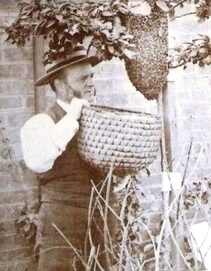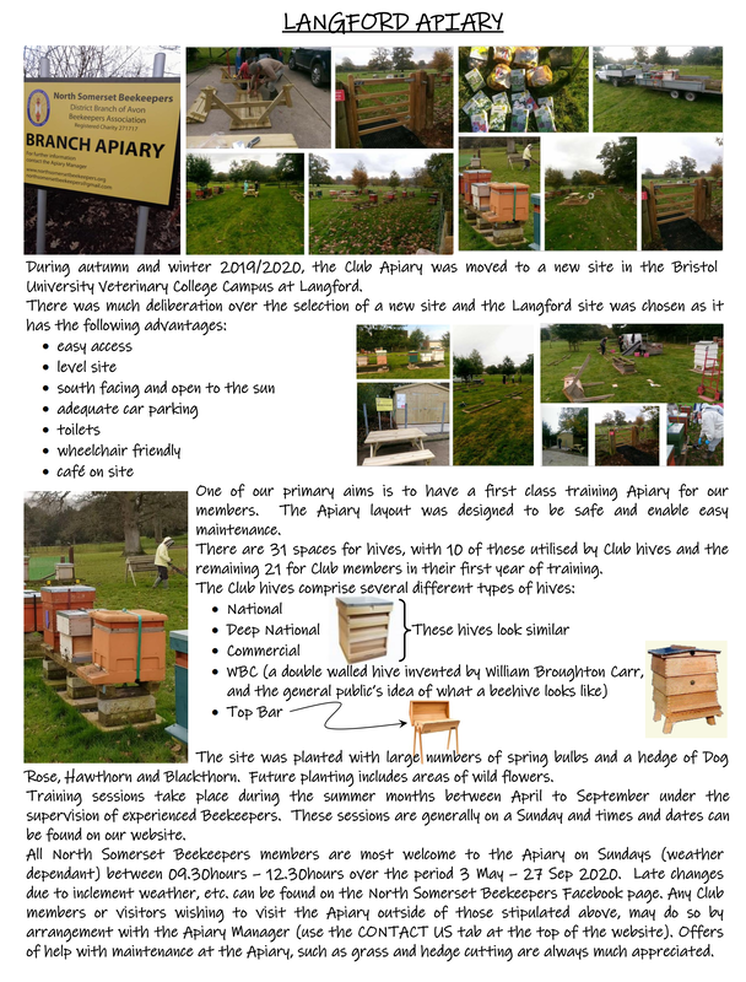NORTH SOMERSET BEEKEEPERS
WHO ARE WE?
North Somerset Beekeepers supports local beekeepers by promoting practical skills in beekeeping a well as a better understanding of key environmental issues which affect the health and well-being of bees. Members are encouraged to improve the local genetic pool through careful husbandry of honeybee colonies.
We provide training, promote best practice and offer advice, support and education to beekeepers and the public.
Over the years our members have made – and continue to make - an impressive contribution to British beekeeping at both national and county level.
Over the years our members have made – and continue to make - an impressive contribution to British beekeeping at both national and county level.
Welcome to the CLUB langford Apiary
The teaching apiary at Langford is open to all members of the North Somerset branch of Avon Beekeepers. It is also available, by arrangement, to accompanied visitors who are curious about bees and beekeeping.
The apiary provides hives for teaching groups of newcomers, and also other hives containing the first colonies belonging to new members. In this way club members can be gradually introduced to beekeeping through gentle steps, assuming more and more individual responsibility for the management of honey bees.
The apiary is normally open for training sessions every Sunday morning throughout the Spring and Summer, the exact times will depend on the time of year; see the Apiary Rota in the Members' Section of this website for full details. During those times experienced beekeepers are available to help beginners inspect their bees and manage the colony.
If weather conditions prevent the apiary opening a message will be posted on Twitter (@NSomersetBees) by 09:00 and also the club's Facebook page.
Here are rules for using the club apiary:
In case of emergency please contact the apiary manager, Eric Sortwell, 07990 733480
The apiary provides hives for teaching groups of newcomers, and also other hives containing the first colonies belonging to new members. In this way club members can be gradually introduced to beekeeping through gentle steps, assuming more and more individual responsibility for the management of honey bees.
The apiary is normally open for training sessions every Sunday morning throughout the Spring and Summer, the exact times will depend on the time of year; see the Apiary Rota in the Members' Section of this website for full details. During those times experienced beekeepers are available to help beginners inspect their bees and manage the colony.
If weather conditions prevent the apiary opening a message will be posted on Twitter (@NSomersetBees) by 09:00 and also the club's Facebook page.
Here are rules for using the club apiary:
- You must be a full member of the club in the first year of beekeeping to keep your hive in the apiary. This ensures adequate insurance cover for both your bees and other members' colonies. Stand positions will be allocated by the apiary manager.
- Do not use the apiary alone, in your first year you must always be accompanied by an experienced beekeeper.
- Familiarize yourself with the apiary location in case you have to call the emergency services.
- Ensure that you are wearing suitable protective clothing before entering the apiary. This should include boots and gloves. Leather gloves are not recommended.
- Clean your hive tools regularly. Please clean and disinfect your hive tool in the solution buckets provided before touching another hive.
- Keep the apiary clean and tidy. Remove all waste wax and wash away spilt honey and syrup.
- Maintain the hive record sheets up to date. Each hive has a record sheet on which are written all the observations and actions undertaken during inspections. Contact details for the hive owner should be available, too.
- No hives should be opened without the authorization of the apiary manager or their assistant.
In case of emergency please contact the apiary manager, Eric Sortwell, 07990 733480
Please refer to the following documents for more details
|
| ||||||||||||
North Somerset Beekeepers Apiary,
Langford Campus, Bristol University Veterinary School,
Langford, BS40 5DU
Langford Campus, Bristol University Veterinary School,
Langford, BS40 5DU
History
Founded in 1952 North Somerset Beekeepers have a rich 66 year history.

-L. E. Snelgrove
A Somerset Beekeepers’ Association has been in existence almost continuously since 1876. It was in 1905, however, that L.E. Snelgrove, a young schoolmaster at Weston-super-Mare, became the Honorary Secretary of the former Bristol, Somersetshire and South Gloucestershire Beekeepers Association. He set about re-forming it into one that was viable, effective in fulfilling its function, and covering the whole of the county of Somerset.
North Somerset Beekeeper's predecessor was Somerset Beekeepers’ Association which has existed since 1876.By 1920 there were 20 branches, and Snelgrove moved to place the Association on a more representative and efficient footing. The rules were re-drawn and the branches were placed into five Divisions: Northern, Southern, Eastern, Western and Central.
The emergence of NSBK was In the mid-1970s. Resulting from the Maude report and the creation of the County of Avon, an amicable split occurred, the three Divisions within this new county forming their own Association.
The emergence of NSBK was In the mid-1970s. Resulting from the Maude report and the creation of the County of Avon, an amicable split occurred, the three Divisions within this new county forming their own Association.
